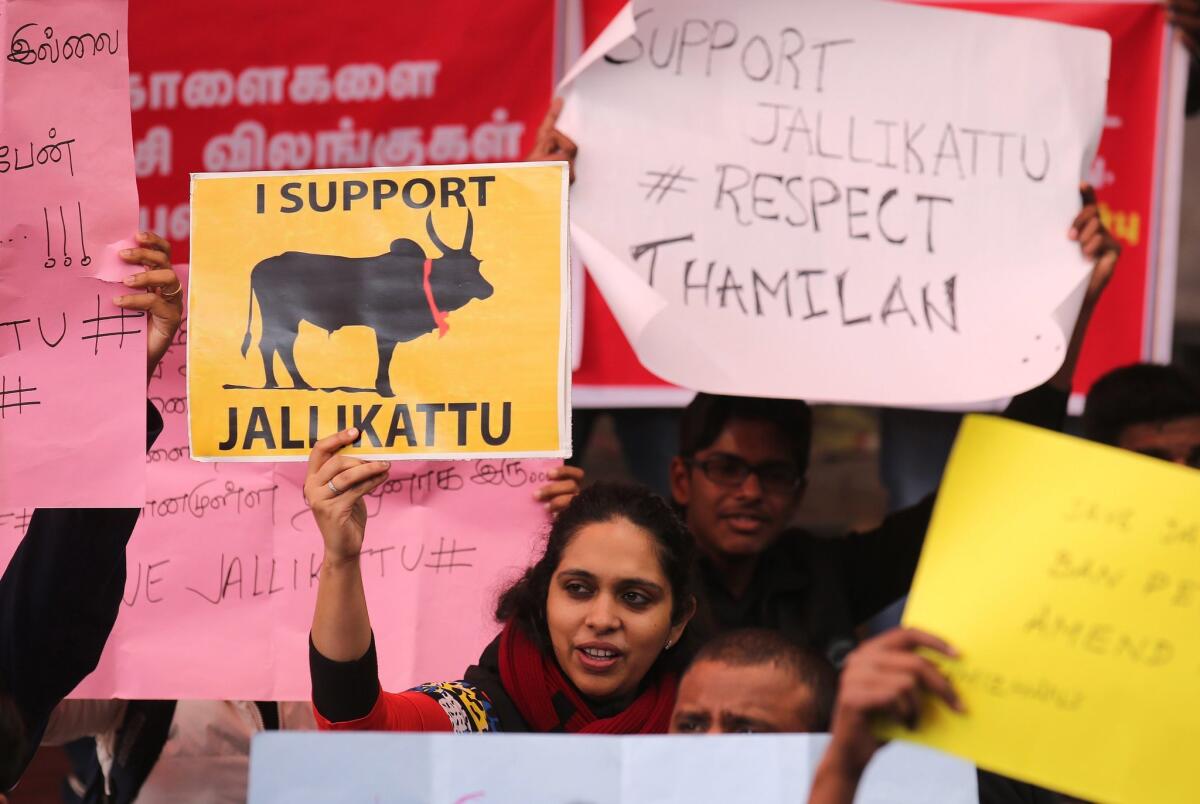In India, the bullfight might go on as officials vow to defy a ban on controversial sport

- Share via
Reporting from Mumbai, India — Bowing to widespread protests across one of India’s most developed states, officials signaled Friday that a controversial bullfighting festival in Tamil Nadu would take place despite a Supreme Court ban.
The sport known as jallikattu, in which young men attempt to wrestle a bull to the ground with their bare hands, was banned in 2014 by India’s highest court, which ruled it was cruel to the animals.
Ethnic Tamil politicians and supporters of the sport have opposed the ban, calling it a part of Tamil culture. Some participants were arrested this month for staging bullfights, triggering protests this week that have brought the metropolis of Chennai, formerly known as Madras, to a standstill.
O. Panneerselvam, the chief minister of Tamil Nadu state, sent a draft ordinance to India’s central government Friday that would allow jallikattu to take place “within a couple of days.” The president, Pranab Mukherjee, was expected to approve the ordinance.
The move effectively bypasses the ruling of the Supreme Court, which has delayed a hearing on whether to keep the ban in place, allowing widespread public protests to outweigh the word of the court.
Animal rights groups led by People for the Ethical Treatment of Animals, or PETA, have campaigned against the sport, saying the bulls’ tails are twisted and bitten by participants, and the animals are injected with alcohol to make them easier to tame. The group said the sport killed 17 people and injured more than 1,000 from 2010 until 2014.
Supporters of the sport say the bulls are well-treated and that the annual rite, which takes place during the harvest festival of Pongal, has been observed for 2,000 years. Jallikattu has long been associated with machismo and rural life, and many bulls are raised especially for the sport.
The debate over jallikattu has revived longstanding grievances in southern India, where Tamils and other ethnic groups have often chafed against what they see as domination by the Hindi-speaking north, home to the capital, New Delhi. The sport has its roots among the upper castes, which have rallied the support of Tamils of all stripes by arguing that it is central to their culture.
“This fight for jallikattu has kindled deep-seated anti-north Indian sentiments that have always existed among the Tamilians,” T.M. Krishna, a singer and activist, wrote in a column for the news site Scroll.in.
For Tamils, who see themselves as a distinct and ancient culture in India, many pointedly favoring their Tamil language over the national tongue of Hindi, Krishna wrote that “this one issue is the nucleus around which every other resentment is being expressed.”
The long beach in Chennai has been the center of protests over the past week that have drawn in Tamil language film stars and other celebrities including Oscar-winning musical director A.R. Rahman. Rahman, of “Slumdog Millionaire” fame, tweeted that he will be fasting in support of jallikattu.
The protests erupted a month after the death of the state’s former chief minister Jayaram Jayalalithaa, a beloved and assertive Tamil figure on the national stage. Commentators said she would have never tolerated such an attack on Tamil culture.
Her successor, Panneerselvam, “was left with no choice” except to find a way to carry on with the sport, said A.R. Venkatachalapathy, a political scientist in Chennai.
Venkatachalapathy said the national debate surrounding the protests had led him to support jallikattu unequivocally.
“The nature of opposition to jallikattu is insensitive to people’s cultural aspirations,” he said. “It is a larger part of the...inferiorizing of Tamil people.”
Parth M.N. is a special correspondent.
More to Read
Sign up for Essential California
The most important California stories and recommendations in your inbox every morning.
You may occasionally receive promotional content from the Los Angeles Times.










